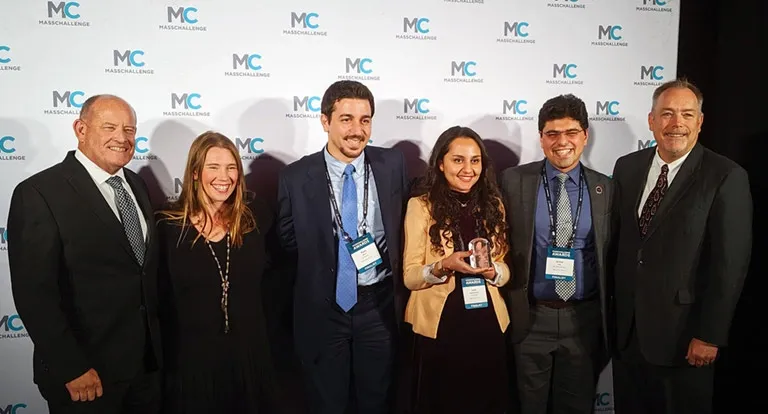Encapsulate, an early-stage company founded by three graduate students at the University of Connecticut School of Engineering, was named last month as one of only two winners of the 2019 International Space Station U.S. Laboratory and Boeing “Technology in Space” Prize. Encapsulate receives $500,000 and the opportunity to conduct research projects onboard the International Space Station (ISS).
Encapsulate is in the process of developing an automated “tumor-on-a-chip” system that can grow a patient’s cancer cells outside the body to evaluate their response to different chemotherapy drugs. The system allow for chemotherapy drugs to be tested prior to starting the actual treatment regimens. This can dramatically enhance the success rates of chemotherapy and compress the amount of time it takes to cure cancer patients.

Imagine a patient, newly diagnosed with cancer that requires chemotherapy. There are several FDA-cleared drugs available for their type of cancer. The doctors will select a drug for the chemotherapy regimen based on the type of cancer and the success rate of the drug in previous patients with the same cancer. The doctors will then have to wait for a period of several weeks to see if their decision in choosing that drug was correct or not. If the choice was incorrect, the whole process starts over again, one treatment option at a time, taking even more weeks or months.
But what if there is a way to test multiple medications and treatment options simultaneously, on the patient’s own cancer cells, allowing doctors to identify the approach that works best on the quickest possible timeline? Encapsulate believes its technology will provide that solution.
“During each ineffective chemotherapy cycle, the tumor becomes stronger and harder to treat,” said Armin Tahmasbi Rad, one of Encapsulate’s founders. “With our technology, we can identify the most effective chemotherapy drug from the very beginning and potentially save millions of lives.”
Rad and his co-founders Leila Daneshmandi and Reza Amin are excited about the opportunity to conduct further testing on their technology in space, a rare opportunity for early-stage companies like Encapsulate. “Testing the process in weightlessness onboard the ISS lab will allow us to evaluate the behavior of patient-derived cancers cells in space,” said Daneshmandi. “It’s a tremendous honor to win the ISS/Boeing prize.”
Through the “Technology in Space Prize,” Boeing and the ISS U.S. National Laboratory have collectively awarded 27 projects and more than $4.5 million in funding since the prize’s inception since 2012. This year’s awardees, which were selected from innovative companies participating in MassChallenge Boston, were Encapsulate and Axonis, a Boston-based company working on neurodegenerative therapies.
All three of Encapsulate’s co-founders have utilized the resources at UConn to grow their startup into a thriving, growing business. Rad and Amin have been involved in UConn’s newly launched Master of Engineering in Global Entrepreneurship program, funded by CTNext, and Encapsulate has thrived using the resources of UConn’s NSF I-Corps Site, Accelerate UConn, Innovation Quest, and the Technology Incubation Program (TIP), which provides lab space, business support, and a network of experienced investors and entrepreneurs.
“UConn is home to some of the most talented, innovative students and faculty in the world and we are committed to supporting their journey as entrepreneurs,” said Radenka Maric, Vice President for Research, Innovation and Entrepreneurship at UConn and UConn Health. “Teams like Encapsulate highlight the value of a UConn education and how it can translate into life-saving technologies that help society and encourage economic growth in our state.”
Encapsulate was recently named a member company in the first cohort of Hartford’s new Digital Health medtech accelerator, a new collaborative initiative launched through the state’s Innovation Places program to help extremely promising startups in the medical technology sector obtain the knowledge and resources to spur their growth and success. The company is also a recent winner of CTNext’s Entrepreneur Innovation Award and was a member of the first cohort of CTNext’s new Mentor Network. In the past summer, they were also selected to participate in the highly prestigious MassChallenge (Boston) startup accelerator program as one of only three Connecticut-based companies.
For more information about Encapsulate, contact Armin Tahmasbi Rad at armin@uconn.edu.
Media Contact: Tom Bradley, CTNext, (860) 967-5357, email thomas.bradley@ctinnovations.com
